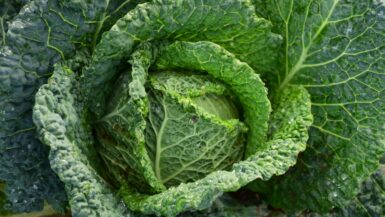Vitamins are essential nutrients that our bodies require to function properly. Among the many vitamins that we need, vitamin K is one that often goes unnoticed. However, this vitamin plays a crucial role in maintaining our overall health, especially when it comes to blood clotting and bone health. While many people may not be aware of the importance of vitamin K, it is a vital nutrient that should be included in a healthy diet. In this article, we will explore the role of vitamin K in our bodies and why it is important to make sure we are getting enough of it in our diets.
What is vitamin K and why is it important for our health?
Vitamin K is a fat-soluble vitamin that plays a crucial role in various bodily functions, including blood clotting and bone metabolism. It is essential for the synthesis of certain proteins that are important for blood coagulation and bone formation. The name “vitamin K” is derived from the German word “Koagulationsvitamin” which means “clotting vitamin” as it was first discovered for its role in blood clotting.
Apart from its role in blood clotting and bone metabolism, vitamin K has also been linked to other health benefits such as reducing the risk of heart disease and promoting brain function. Vitamin K is available in different forms, including vitamin K1 and vitamin K2, and can be obtained from various food sources or supplements.
In the following sections, we will discuss the different types of vitamin K, their sources, the recommended daily intake, and the role of vitamin K in blood clotting and bone health. We will also look at vitamin K deficiency, foods that are rich in vitamin K, how to incorporate vitamin K into your diet, vitamin K supplements, and the potential risks and side effects of consuming too much vitamin K.
The different types of vitamin K and their sources
There are two main types of vitamin K: vitamin K1 (phylloquinone) and vitamin K2 (menaquinone). Vitamin K1 is found in green leafy vegetables such as spinach, kale, broccoli, and lettuce. It is also present in some vegetable oils such as soybean oil and canola oil. Vitamin K2, on the other hand, is found in animal products such as meat, cheese, and eggs, as well as fermented foods like natto, a Japanese dish made from fermented soybeans.
Vitamin K2 is further classified into several subtypes, including MK-4 to MK-14, with each subtype having a slightly different structure and function. The main dietary sources of vitamin K2 are animal products, particularly liver and other organ meats, and fermented foods like cheese and natto.
While vitamin K1 is more abundant in the diet than vitamin K2, both forms are important for our health. Vitamin K1 is primarily involved in blood clotting, while vitamin K2 plays a crucial role in bone metabolism and cardiovascular health.
In the next section, we will discuss the recommended daily intake of vitamin K and the different factors that can affect our vitamin K status.
The recommended daily intake of vitamin K
The recommended daily intake (RDI) of vitamin K varies depending on age, gender, and other factors such as pregnancy and lactation. According to the National Institutes of Health (NIH), the RDI for vitamin K1 is 90 micrograms (mcg) per day for women and 120 mcg per day for men. For vitamin K2, there is no established RDI, but some studies suggest a daily intake of at least 45 mcg may be beneficial for bone health.
It is important to note that the RDI is the minimum amount of vitamin K needed to prevent deficiency and does not necessarily reflect the optimal intake for health. Some individuals may require higher amounts of vitamin K depending on their health status and other factors.
Factors that can affect our vitamin K status include the use of certain medications, such as antibiotics and blood thinners, as well as digestive disorders that can impair vitamin K absorption. Individuals with liver disease or who have undergone bariatric surgery may also be at increased risk of vitamin K deficiency.
In the next section, we will discuss the role of vitamin K in blood clotting and bone health, and how adequate intake of this vitamin is essential for these functions.
The role of vitamin K in blood clotting and bone health
Vitamin K plays a crucial role in blood clotting and bone metabolism. In blood clotting, vitamin K is required for the synthesis of certain proteins, including prothrombin and factors VII, IX, and X, which are essential for the formation of blood clots. Without adequate vitamin K, bleeding disorders such as bruising and hemorrhage can occur.
In bone metabolism, vitamin K is involved in the activation of osteocalcin, a protein that is essential for bone mineralization. Vitamin K deficiency has been linked to an increased risk of osteoporosis and fractures, particularly in postmenopausal women.
In addition to its role in blood clotting and bone health, vitamin K has also been linked to other health benefits such as reducing the risk of heart disease and promoting brain function. However, more research is needed to fully understand the potential benefits of vitamin K for these conditions.
It is important to ensure adequate intake of vitamin K through the diet or supplements to support these essential bodily functions. In the next section, we will discuss vitamin K deficiency and its symptoms, and how to prevent it.
Vitamin K deficiency and its symptoms
Vitamin K deficiency is rare in healthy adults as the body can store vitamin K in the liver for several days to weeks. However, certain conditions or medications can interfere with vitamin K absorption or utilization, leading to a deficiency.
Symptoms of vitamin K deficiency can include easy bruising, bleeding gums, nosebleeds, and prolonged bleeding from cuts or injuries. Severe deficiency can also lead to internal bleeding, particularly in the gastrointestinal tract.
Individuals at increased risk of vitamin K deficiency include those with digestive disorders such as celiac disease or inflammatory bowel disease, those taking medications that interfere with vitamin K metabolism, and those with liver disease or who have undergone bariatric surgery.
To prevent vitamin K deficiency, it is important to consume adequate amounts of vitamin K through the diet or supplements. In the next section, we will discuss foods that are rich in vitamin K and how to incorporate them into your diet.
Foods that are rich in vitamin K
There are many foods that are rich in vitamin K, making it easy to obtain adequate amounts of this nutrient through the diet. The highest sources of vitamin K1 include green leafy vegetables such as spinach, kale, collard greens, and turnip greens. Other good sources of vitamin K1 include broccoli, brussels sprouts, asparagus, and green beans.
Animal products such as liver, egg yolks, and dairy products also contain small amounts of vitamin K1. Fermented foods like natto and sauerkraut are rich in vitamin K2, particularly the subtype MK-7.
It is important to note that vitamin K content can vary depending on the cooking method and storage conditions. Boiling or microwaving vegetables can cause some of the vitamin K to leach out, while freezing can preserve vitamin K content.
Incorporating a variety of vitamin K-rich foods into your diet can help ensure adequate intake of this nutrient. In the next section, we will discuss how to incorporate vitamin K into your diet and share some recipe ideas.
How to incorporate vitamin K into your diet
Incorporating vitamin K-rich foods into your diet is easy and can be delicious. Here are some tips on how to increase your intake of this important nutrient:
1. Add green leafy vegetables to your meals: Try adding spinach or kale to your smoothies, salads or soups. You can also sauté them with garlic and olive oil for a tasty side dish.
2. Snack on raw vegetables: Carrots, celery, and bell peppers are great options for a healthy snack. Dip them in hummus or guacamole for added flavor.
3. Include fermented foods in your diet: Natto, sauerkraut, and kimchi are all great sources of vitamin K2. Try adding them to your meals as a side dish or topping.
4. Eat more eggs: Egg yolks are a good source of vitamin K1. Try adding boiled eggs to your salads or sandwiches for a protein-packed meal.
5. Choose vitamin K-rich fruits: Avocado and kiwi are both high in vitamin K1. Add them to your smoothies or eat them as a snack.
6. Use vegetable oils in your cooking: Soybean oil, canola oil, and olive oil are all good sources of vitamin K1. Use them in your cooking or as a salad dressing.
By incorporating a variety of vitamin K-rich foods into your diet, you can easily meet your daily recommended intake of this important nutrient. In the next section, we will discuss whether vitamin K supplements are necessary and the potential risks of consuming too much vitamin K.
Vitamin K supplements: Are they necessary?
While getting enough vitamin K from our diet is essential, taking supplements may not be necessary for most people. In fact, it’s generally recommended to get your vitamins and minerals from whole foods rather than supplements.
However, certain individuals may benefit from vitamin K supplements, such as those who have difficulty absorbing fat-soluble vitamins, including vitamin K. This includes people with Crohn’s disease, celiac disease, and other conditions that affect the digestive system.
Additionally, some medications can interfere with vitamin K absorption or increase its breakdown in the body. For example, antibiotics, cholesterol-lowering drugs, and blood thinners can all affect vitamin K status. People taking these medications may need to supplement with vitamin K to maintain adequate levels.
It’s important to note that taking high doses of vitamin K supplements can have adverse effects, particularly for people taking blood-thinning medications. Therefore, it’s essential to speak with a healthcare provider before taking any vitamin K supplements.
In summary, for most people, getting sufficient vitamin K from a balanced diet is the best way to maintain good health. However, certain individuals may need to supplement with vitamin K, and it’s important to speak with a healthcare provider before doing so.
The potential risks and side effects of consuming too much vitamin K
Vitamin K is generally safe and well-tolerated when consumed in recommended amounts. However, excessive intake of vitamin K can cause adverse effects, particularly in people taking certain medications or with certain medical conditions.
Risks for people taking blood-thinning medications
People taking blood-thinning medications such as warfarin or coumadin should be cautious about their vitamin K intake. These medications work by inhibiting the action of vitamin K in the body, which helps to prevent blood clots. Consuming too much vitamin K can counteract the effects of these medications, leading to an increased risk of blood clots.
Risks for people with liver disease
People with liver disease may be at risk of vitamin K toxicity if their liver is unable to properly process the vitamin. This can lead to an accumulation of vitamin K in the body, which can cause adverse effects such as jaundice, liver damage, and anemia.
Other potential side effects
Consuming very high amounts of vitamin K can also cause gastrointestinal symptoms such as nausea, vomiting, and diarrhea. However, these symptoms are rare and typically only occur with extremely high doses of vitamin K supplements.
It’s important to note that consuming vitamin K from food sources is generally safe and unlikely to cause adverse effects. The potential risks and side effects of vitamin K are primarily associated with high-dose supplements.
In summary, while vitamin K is an essential nutrient for good health, consuming too much can have adverse effects, particularly for people taking certain medications or with certain medical conditions. It’s important to speak with a healthcare provider before taking any vitamin K supplements and to consume vitamin K from food sources as part of a balanced diet.





Leave a reply